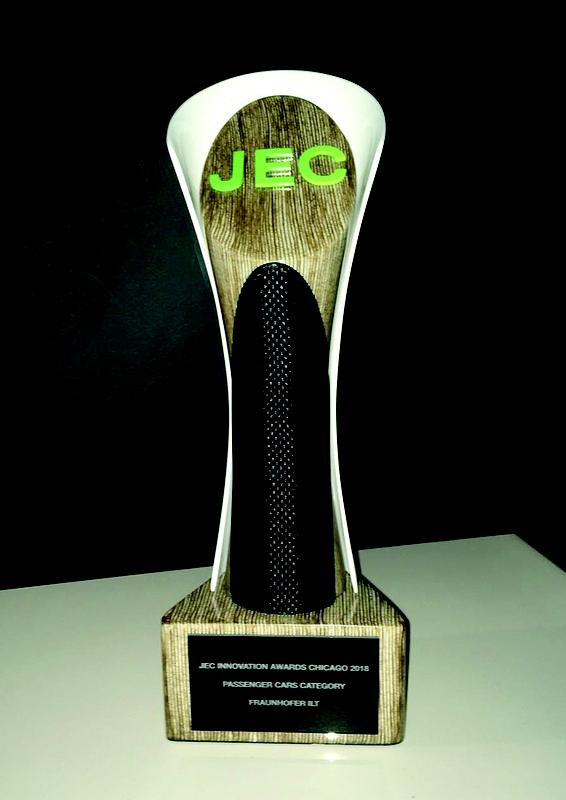“Future of Composites in Transportation 2018”, JEC Innovation Award for hybrid roof bow

On June 27, 2018, the development and manufacture of the hybrid roof bow received the "Future of Composites in Transportation 2018 Innovation Award" in Chicago. © Fraunhofer ILT, Aachen, Germany
The timing of the award presentation is perfect: After all, the “Future of Composites in Transportation 2018 Innovation Award” will serve as the culmination of the HyBriLight project, which ended in June and was funded by the German Federal Ministry of Education and Research (BMBF).
Along with industrial partners, the Fraunhofer Institutes ILT and LBF spent nearly four years developing new photonic tools for lightweight production. The highlight of this project is a component known as a hybrid roof bow, which allows project partners to demonstrate how to optimize a hybrid automotive component for series production.
Shorter process time and reduced costs of raw materials
The hybrid roof bow is based on an original component in a BMW 7 Series vehicle. It consists of a fiber-reinforced plastic brace and metallic joining partners, which connect the hybrid roof bow with the chassis. As an alternative to the conventional approach of adhesive bonding and riveting, Fraunhofer ILT developed a new laser-based process that joins plastic and metal by means of adhesion and positive locking.
The company Weber Fibertech optimized the design of the component. Project partners can be proud of their joint innovation, which reduces process times by 70 percent compared to conventional methods, cuts the costs of raw materials in half and integrates multiple process steps into a single, highly automated process.
The HyBriLight exhibition piece demonstrates just how successfully researchers and manufacturers can jointly realize practical, new laser-based techniques for lightweight production. These innovative techniques even surpass conventional approaches in many parameters, such as shear loading (maximum of 50 MPa) and resistance to internal pressure (maximum of 45 bar), which is crucial to tightness.
HyBriLight project
The BMBF project HyBriLight developed photonic tools for lightweight production. More precisely, this endeavor focused on a “process chain adapted for specific materials for cost-efficient and hybrid lightweight production using highly productive laser systems”.
Project partners
– Fraunhofer Institute for Laser Technology ILT, Aachen, Germany (project coordination)
– Fraunhofer Institute for Structural Durability and System Reliability LBF, Darmstadt, Germany
– Weber Fibertech GmbH, Markdorf, Germany
– Werkzeugbau Siegfried Hofmann GmbH, Lichtenfels, Germany
– SCANLAB GmbH, Puchheim, Germany
– Bayerische Motoren Werke Aktiengesellschaft, Munich, Germany
– Airbus Group Innovations, Munich, Germany
– DILAS GmbH, Mainz, Germany
– Held Systems GmbH, Heusenstramm, Germany
Contact
Kira van der Straeten
Group Micro Joining
Telephone +49 241 8906-158
kira.van.der.straeten@ilt.fraunhofer.de
Dr. Ing. Alexander Olowinsky
Group Manager Micro Joining
Telephone +49 241 8906-491
alexander.olowinsky@ilt.fraunhofer.de
Media Contact
All latest news from the category: Awards Funding
Newest articles

First-of-its-kind study uses remote sensing to monitor plastic debris in rivers and lakes
Remote sensing creates a cost-effective solution to monitoring plastic pollution. A first-of-its-kind study from researchers at the University of Minnesota Twin Cities shows how remote sensing can help monitor and…

Laser-based artificial neuron mimics nerve cell functions at lightning speed
With a processing speed a billion times faster than nature, chip-based laser neuron could help advance AI tasks such as pattern recognition and sequence prediction. Researchers have developed a laser-based…

Optimising the processing of plastic waste
Just one look in the yellow bin reveals a colourful jumble of different types of plastic. However, the purer and more uniform plastic waste is, the easier it is to…



